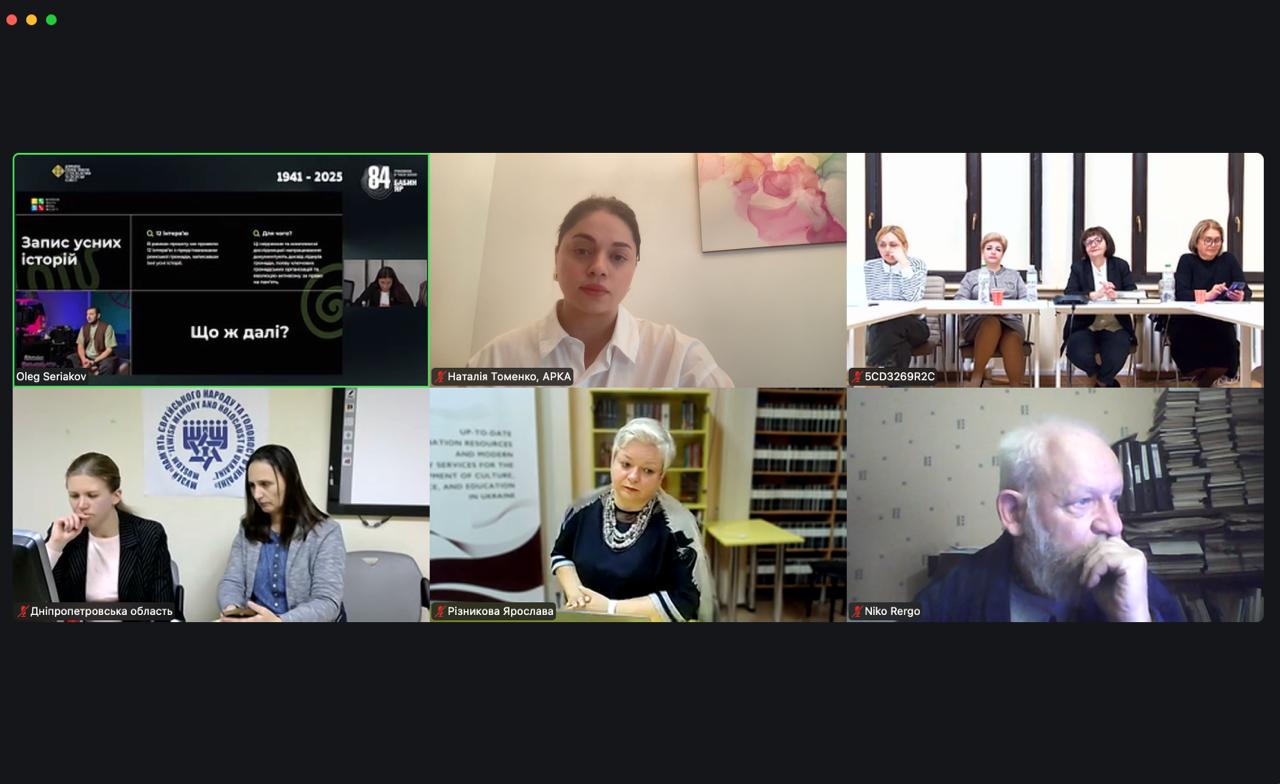Babyn Yar: And the Thousands of Ravines of Memory. How We Reflect on the Past During Wartime
A roundtable discussion titled “Babyn Yar: And the Thousands of Ravines of Memory Across Ukraine” brought together historians, museum professionals, researchers, and civil society representatives. The event aimed to explore approaches to preserving the memory of genocide, and to discuss new research initiatives and cultural practices that help reframe the tragic pages of the past.
Natalia Tomenko, Deputy Director of the Youth Agency for the Advocacy of Roma Culture ARCA, took part in the event, speaking in the panel discussion “Art and Memory.” Alongside colleagues from museums, national memory institutes, and cultural centers, she discussed how contemporary art enables conversations about genocide, trauma, and the experience of survival.
Participants reflected on the role of culture in preserving historical memory and how art can help restore dialogue between generations and communities. The memory of 20th-century tragedies is not only about archives or scholarly work — it is also a contemporary cultural effort that allows society to critically engage with the past.
“The exhibition ‘The Invisible. Resilience: The Past and Present of Roma’ is an attempt to look at history through personal stories. It leads visitors along a journey — from invisibility to voice. From archival documents about the genocide of Roma and eyewitness testimonies to contemporary artworks through which young artists interpret the experiences of their families and their own identities,” noted Natalia Tomenko during her presentation.
The exhibition, developed by ARCA, integrates historical documents, maps of execution sites, archival photographs, artistic works, and digital components — including animation, an interactive book, and video testimonies. It concludes with a documentary theater performance “Voices That Have Names,” which links the history of the Roma genocide with the experience of Roma communities during the current full-scale war.

The roundtable also emphasized the importance of ongoing research, testimony collection, and archival work — particularly with materials that had long been inaccessible or silenced. Both fascist and Soviet regimes actively suppressed evidence of crimes against Roma, Jews, and other persecuted groups. Today, restoring historical truth is not only about remembrance — it is also a matter of justice.
In times of war, such initiatives carry particular significance. Russian attacks on the Babyn Yar site serve as a symbolic reminder of attempts to erase memory and destroy cultural markers of identity. That is why supporting public dialogue, cultural initiatives, and research projects dedicated to memory preservation is critically important.
See also
- Roma Women’s Testimony from Ukraine at the United Nations Holocaust Memorial Ceremony
- Roma rights and the challenges of war: results of a discussion in Berlin
- Roma Inclusion in Focus – Strengthening Partnerships Between Ukraine and Germany
- The film “Named Voices” was presented at an international conference
- ARСA representative participates in OSCE conference on human rights
- Voices of Memory and Future: ARCA’s Participation in the 5-Year Anniversary of the Program
- ARCA Representatives Hold Lecture at the MFA to Mark Roma Genocide Remembrance Day
- Roma Programme Featured at One of Europe’s Largest Conferences
- In New York City, the 69th session of the UN Commission on the Status of Women is underway
- A screening of a movie about the Roma Genocide took place in Berlin
- Michael Roth: “Roma are the largest ethnic community. And its contribution should be recognized”
- Humanitarian Aid, Human Rights, Equality: Challenges faced by the Roma Community
- Participation in the panel discussion “Challenges Faced by Ukrainian Roma in the Ukraine”
- Attitude towards minorities is an important indicator of Ukraine's readiness to accede to the EU
- A networking meeting between civil society participants
- We are already planning the restoration of Ukraine: an international conference has begun
- Participation in DEZIM CONFERENCE 2024
- The Art of Memory: How the Romani Tragedy Resurrects from Oblivion
- The Forum dedicated to the 140th Anniversary of the Female Movement in Ukraine
- "Romanis must be included in the processes of Ukraine’s Reconstruction", – Volodymyr Yakovenko
- The event "Roma contribution to the Recovery of Ukraine"
- The Council of Europe Dialogue with Roma and Traveler civil society
- Conference on Ukraine's recovery in Berlin
- Educational event "Roma in Ukraine - fighters for democracy, human rights and justice" was held
- Ukrainian Decolonization: the Untold Roma Stories
- Public event "Roma in Ukraine – Fighters for Democracy, Human Rights and Justice"
- Mapping the Challenges faced by Ukrainian Roma in a War Time and Overcoming the Obstacles
- Cafe Kyiv event took place in Berlin
- Respect, Recognition and Rights of National Minorities in Ukraine
- Consultation meeting on opportunities for Roma youth realization
- Meeting with a member of the Bundestag
- Conference “Roma as an integral part of Ukrainian society”
- Forum of Roma civil society
- "The Russian War Against Ukraine and Its Consequences for Roma" conference
- First day of Roma Civil Society Forum
- The Sastipe project
- The project Through my mind
- DIKH HE NA BISTER - Roma Genocide Remembrance Initiative